Searching for spatial information science that would be useful for
everyone in the future,
the Anagura researchers went to meet six researchers.
everyone in the future,
the Anagura researchers went to meet six researchers.
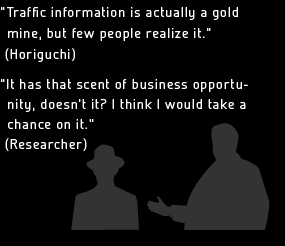
I am developing devices that create useful value for everyone from a lot of information. One of them is Shiawase [Happiness], which creates songs from people's movement information. Next I am thinking of developing a device that transforms the information possessed by cars into value, so I visited an expert in road traffic information.
(At i-Transport Lab. Co., Ltd., on a certain day in the year 2011)
- Researcher
- Your specialty is intelligent transport systems. What are the ideas behind your research?
- Horiguchi
- First of all, I believe that people's movement changes a lot as a result of information. When people move, they decide their plans and schedules with reference to various knowledge, don't they? So I am interested in what information supplied and when would make people happy at such times and enable efficient movement. I have been conducting research on automobile transport. In the case of information on road congestion, for example, the questions are what data to collect, how to determine the degree of congestion, and how to convey the information to drivers. System information, such as road signal control, is included as well, but really the theme of my research is how to make and utilize information in order to facilitate people's movement.
- Researcher
- Did you have some kind of problem awareness?
- Horiguchi
- There is a hypothesis called the time conservation low, which says that the time when people move during the day actually has not changed very much from the primitive age, when human beings were chasing mammoths, to the present. In a sense, human beings live by moving. And if that is the case, everyone must be hoping that movement can be made as pleasant as possible.
- Researcher
- I see. There's certainly some truth in that.
- Horiguchi
- In our present society, however, what with the traffic congestion and rush-hour commuting, movement is definitely not very pleasant. One of the reasons lies in our lifestyle. In large cities, residences and workplaces are not close together, so movement is essential. Because people flock to the same place at the same time, congestion occurs. Twenty years ago we were able to respond by expanding infrastructure, such as roads and railways, but today we do not have that space. So the only way forward is to improve operation. And one aspect of that is the effective utilization of information.
- Researcher
- How is traffic information being utilized now?
- Horiguchi
- Sensors to monitor congestion and crowding have been installed on main trunk roads, but because of the cost they cannot be installed on other minor roads. So the question is how to gather information on roads without sensors. This question gave rise to the idea that cars themselves can play the role of sensors. Such cars are called probes, and they have already been commercialized. The mechanism is that GPS location data from the probe cars is sent to the server of the Traffic Information Center, which processes the statistics and feeds them back as traffic information.
- Researcher
- It's a centralized system then?
- Horiguchi
- Yes. But there are problems with it. First, the system is enormously expensive. Second, telecommunication expenses are incurred in the exchange of data. Third, there is a time lag of 10窶錀15 minutes from the gathering to the supply of information. By the time drivers receive the information, the congestion may have been relieved. Therefore, what was conceived in response was the "center-less probe system." In other words, since this system is center-less, there is no central server.
- Researcher
- I want to hear a little bit more about this system. If there is no server, where does the information come from?
- Horiguchi
- The cars themselves would directly exchange information. It's called "inter-vehicle communication." The cars ahead of you, or the cars coming in the opposite direction, know information about the road ahead of you. So cars automatically create information about congestion ahead, for example, and send it to others. It's like playing catch with information. Drivers can use a method of communication that is not expensive, such as wireless LAN, and the information is extremely fresh, because it arises there and then.
- Researcher
- In other words, traffic jam information would be obtained just from the movement of cars. Is that possible?
- Horiguchi
- That is my research theme. For example, it would be difficult obtaining traffic jam information from the movement of a single car, wouldn't it? If that car stopped at a red traffic light, or the driver popped into a convenience store, it would mistakenly be taken as traffic jam information. So what should be done to provide sufficiently reliable information to people? The answer is to statistically process information obtained from various cars, including your own car, and turn it into reliable information that can be used. Information obtained from a single car cannot be trusted, but if the same information is conveyed by many cars in the vicinity, it is highly reliable. There is value in widely disseminating that information.
- Researcher
- It's a technology for extracting valuable information from the great mishmash of information. It would be good if such information could be accumulated and then used by everyone, wouldn't it?
- Horiguchi
- Yes indeed, it is the accumulation of information that is important. But at present it cannot be said that traffic information is being fully accumulated and utilized. A mechanism for efficiently accumulating information has not yet been established. For example, even if we collect information for distribution to car navigation systems, it is only used once. Weather forecasts are possible because of the accumulation of data over the past few decades. If traffic information could be dug up, I think we would find all kinds of gems. If past assets were properly maintained, like weather forecasters, there could be traffic forecasters or traffic jam forecasters.
- Researcher
- How will the center-type and center-less systems be differentiated in the future?
- Horiguchi
- I think they will cooperate while mutually complementing each other's weak points. The information sent to the center could be information about trunk roads over a wide area, which is required by many people. Conversely, since there is no need to notify many people of information about minor roads in a locality, such information could be consumed only in that district. In other words, center-less probes would engage in the local production and local consumption of information. As it is locally produced and locally consumed information, it could include not only traffic jam information but also information about local services, such as supermarket bargains or car park vacancies. Furthermore, it would be good to have not only data distribution but also program distribution.
- Researcher
- There's a possibility of other businesses being created, isn't there?
- Horiguchi
- What I always feel is that even if companies want to enter the ITS field, the system is so huge that in practice it is only large companies that can do so. In the case of center-less probes, however, anyone can make software to operate in them. In order to notify various people about local services, a small local software company could create applications and distribute them to cars passing through the area. It would be like a local iTunes store. These applications would only be accessible in that area, but they would be useful in that area.
- Researcher
- I feel like dashing out of Anagura and following up on what you have been saying!
- Horiguchi
- So far the merit of information technology has been that it enables access to information without limitations of space. But I think information that can only be obtained by going to a certain place has a certain value too.

Ryota Horiguchi
President, i-Transport Lab. Co., Ltd.
i-Transport Lab. Co., Ltd.
http://www.i-transportlab.jp
i-Transport Lab. Co., Ltd.
http://www.i-transportlab.jp








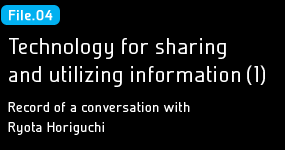



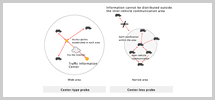
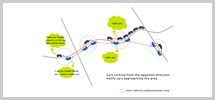


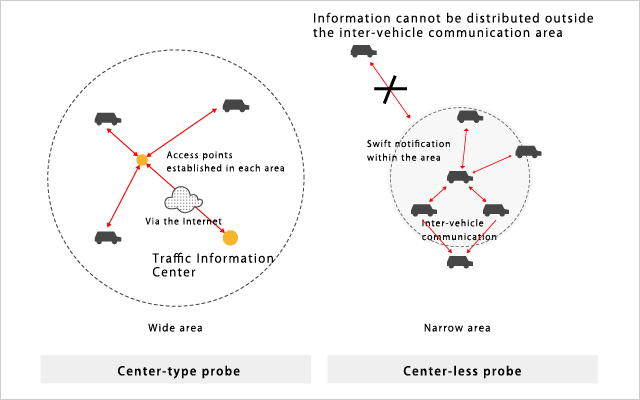 The Center-type Probe and the Center-less Probe
The Center-type Probe and the Center-less Probe
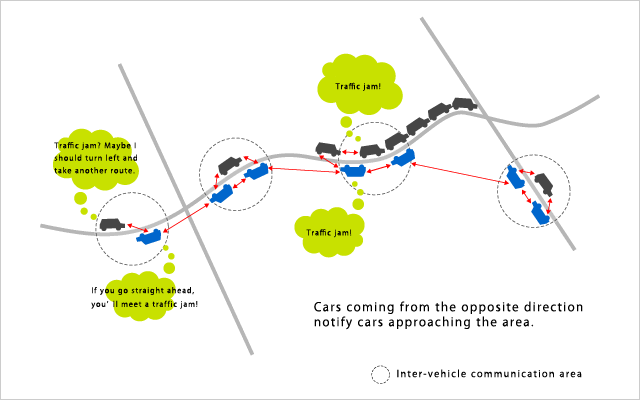 Example of Congestion Information Exchanged by Center-less Probes
Example of Congestion Information Exchanged by Center-less Probes
 Page top
Page top
